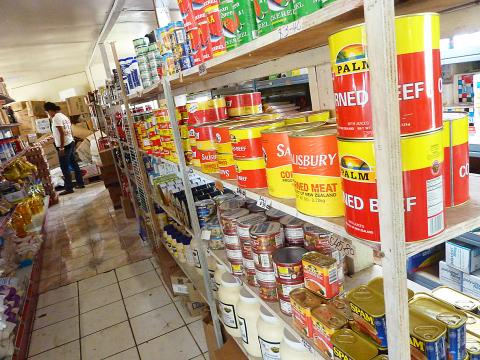On Tonga’s supermarket shelves, huge cans of corned beef the size of paint tins replaced traditional fare such as fish and coconuts long ago — contributing to an obesity epidemic that sees the Pacific region ranked as the fattest in the world.
Meat in Tonga almost invariably comes in a tin, whether it be turkey breast, meat loaf, luncheon meat or Spam, which can be bought in a variety of forms including smoked, with chilli or laced with cheese for an extra calorie hit.
The common denominator, Tonga’s Chief Medical Officer Malakai Ake says, is that the “junk meat” is loaded with salt and saturated fats, meaning islanders’ waistlines continue to expand.

Photo: AFP
“This is the biggest issue facing Tonga,” he said, citing soaring levels of weight-related coronary disease, diabetes and strokes among islanders.
“Every other day there’s a funeral, a next-door neighbor, a relative, a friend. It’s always heart disease, diabetes, it’s ridiculous,” Ake said.
The Tongan Health Department says more than 90 percent of the total population is classed as overweight and more than 60 percent is obese.

Photo: AFP
According to World Health Organization (WHO) data released last year, Pacific island nations account for eight of the top 10 countries where the male population is overweight or obese.
Weight-related diseases are responsible for three-quarters of deaths in the region, Fiji-based WHO nutritionist Temo Waqanivalu said, with diabetes rates close to 50 percent in some Pacific nations.
“It’s a problem that health systems are struggling to deal with,” he said.
“If you walk into a hospital in any of the Pacific countries, about 75 percent to 80 percent of the surgeries are the result of non--communicable diseases linked to obesity,” Waqanivalu said.
Experts say economic, cultural and lifestyle factors have combined to make the obesity epidemic, which is an increasing problem across the globe, more acute in the Pacific.
Ake said the traditional lifestyles, where people kept fit through farming and fishing, gave way to a more sedentary existence in recent years and motor vehicles became more readily available.
“In my young days we would walk everywhere and go swimming,” he said. “Now people use the car to go just a little way down the street.”
Traditional diets based around fish and root crops have also fallen out of favor, replaced with fatty foods imported from Western nations that islanders see as more convenient and prestigious.
“They are unable to compete with the glamor and flashiness of imported foods,” Waqanivalu said, adding that cash-strapped consumers in the Pacific often had little choice about making poor dietary choices.
“In some countries it’s cheaper to buy a fizzy drink than a bottle of water,” he said.
“When they go down the aisle of the supermarket, probably the last thing people are looking at is the nutritional information, they’re looking at the price,” he said.
Pacific islanders sometimes argue that they naturally have big frames and are more prone to put on weight than other people, although it’s a theory Waqanivalu rejects.
He said a generous girth had long been seen as a sign of status in the Pacific, but the message was slowly getting out that bigger is not necessarily better.
“We’re telling people that being large is OK but being fat is different and that’s what we’re beginning to see,” he said.
Tonga’s late King Tupou IV, who died in 2006, helped raise awareness about obesity in the 1990s, when he organized a national diet and exercise routine after receiving warnings from his doctors about his weight.
Listed by the Guinness Book of Records as the heaviest monarch in the world at almost 210kg, he reportedly lost 70kg.
Tongan Prime Minister Lord Tu’ivakano has said more needed to be done to combat the obesity problem and his government is looking into possible restricting imports such as mutton flaps — cheap, fatty sheep offcuts popular in the country.
“We have to go back to the old ways, just eating good food — taros, kumaras [sweet potatoes], yams,” he said
“It’s a matter of saying: ‘sorry, you have to find an alternative,’ probably eating fish rather than mutton flaps,” he said.

Brazil, the world’s largest Roman Catholic country, saw its Catholic population decline further in 2022, while evangelical Christians and those with no religion continued to rise, census data released on Friday by the Brazilian Institute of Geography and Statistics (IBGE) showed. The census indicated that Brazil had 100.2 million Roman Catholics in 2022, accounting for 56.7 percent of the population, down from 65.1 percent or 105.4 million recorded in the 2010 census. Meanwhile, the share of evangelical Christians rose to 26.9 percent last year, up from 21.6 percent in 2010, adding 12 million followers to reach 47.4 million — the highest figure

A Chinese scientist was arrested while arriving in the US at Detroit airport, the second case in days involving the alleged smuggling of biological material, authorities said on Monday. The scientist is accused of shipping biological material months ago to staff at a laboratory at the University of Michigan. The FBI, in a court filing, described it as material related to certain worms and requires a government permit. “The guidelines for importing biological materials into the US for research purposes are stringent, but clear, and actions like this undermine the legitimate work of other visiting scholars,” said John Nowak, who leads field

‘THE RED LINE’: Colombian President Gustavo Petro promised a thorough probe into the attack on the senator, who had announced his presidential bid in March Colombian Senator Miguel Uribe Turbay, a possible candidate in the country’s presidential election next year, was shot and wounded at a campaign rally in Bogota on Saturday, authorities said. His conservative Democratic Center party released a statement calling it “an unacceptable act of violence.” The attack took place in a park in the Fontibon neighborhood when armed assailants shot him from behind, said the right-wing Democratic Center, which was the party of former Colombian president Alvaro Uribe. The men are not related. Images circulating on social media showed Uribe Turbay, 39, covered in blood being held by several people. The Santa Fe Foundation

NUCLEAR WARNING: Elites are carelessly fomenting fear and tensions between nuclear powers, perhaps because they have access to shelters, Tulsi Gabbard said After a trip to Hiroshima, US Director of National Intelligence Tulsi Gabbard on Tuesday warned that “warmongers” were pushing the world to the brink of nuclear war. Gabbard did not specify her concerns. Gabbard posted on social media a video of grisly footage from the world’s first nuclear attack and of her staring reflectively at the Hiroshima Peace Memorial. On Aug. 6, 1945, the US obliterated Hiroshima, killing 140,000 people in the explosion and by the end of the year from the uranium bomb’s effects. Three days later, a US plane dropped a plutonium bomb on Nagasaki, leaving abut 74,000 people dead by the